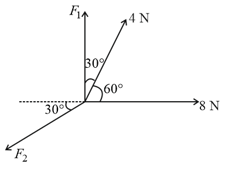Equilibrium of a Particle
Equilibrium of a Particle: Overview
This topic consists of various concepts like Resolution of a Force,Equilibrium of Forces,Concurrent Forces, etc.
Important Questions on Equilibrium of a Particle
A block of mass is placed on a smooth wedge of inclination . The whole system is accelerated horizontally so that the block does not slip on the wedge. The force exerted by the wedge on the block ( is acceleration due to gravity) will be
Two cubes of masses and be on two frictionless slopes of block A which rests on a horizontal table. The cubes are connected by a string which passes over a pulley as shown in the figure. To what horizontal acceleration f should the whole system (that is the blocks and cubes) be subjected so that the cubes do not slide down the planes? What is the tension of the string in this situation?
Three forces are acting on a particle of mass . The forces and are applied perpendicularly so that particle remains at rest. If the force is removed, then the acceleration of the particle is
Reading in the spring shown below will be
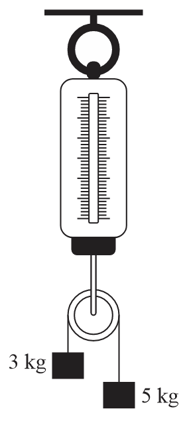
A box is pulled with force of at angle of above the horizontal. Then the horizontal and vertical components of the force are
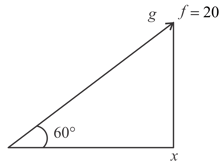
Find the magnitude of the unknown forces and if sum of all forces is zero.
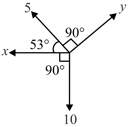
Two rods and are attached to a weight of mass as shown in figure, then:
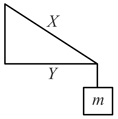
What is equilibrium force in physics? Elaborate with an example the equilibrium of force?
If resultant of these three forces is along -axis, then is equal to:
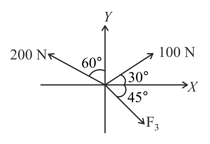
A force making an angle of with positive -axis has a component of along -axis. Write the force in vector form
Give an example of a body in equilibrium but not at rest.
Can a body be in equilibrium, if it is in motion? Explain.
What are the conditions for two colinear forces to be in equilibrium?
Can a body be in equilibrium, even if only one external force acts on it? Explain.
Will a car be in equilibrium while taking a U-turn?
A box slides down a vertical wall with constant speed while a person pushes it up at an angle of with the vertical. If the coefficient of friction between the block and the wall is then the magnitude of the force applied by the person is close to
Explain the equilibrium of forces.
An object is in equilibrium when four concurrent forces, acting in the same plane, are in the directions shown in the figure. Find the magnitudes of and .
